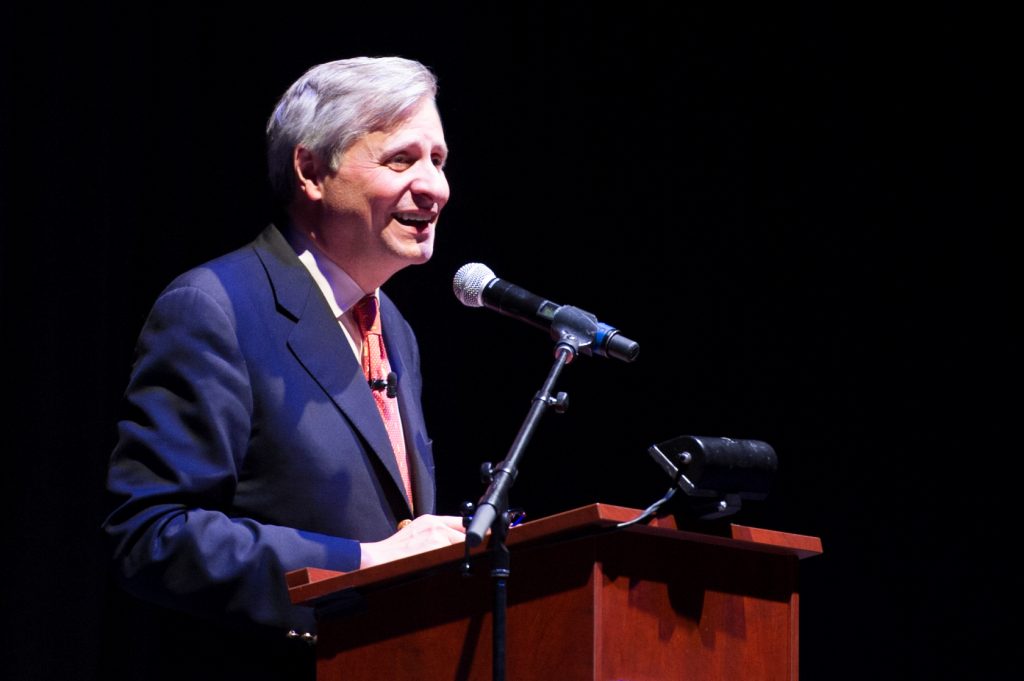
By Dale King
Citizens seem destined to continue protesting, arguing about and fretting over the status of the American presidency and the capacity of newly installed office holder Donald J. Trump to lead the nation.
In the midst of this turmoil, an expert in presidential history, Jon Meacham, visited Boca Raton on Monday evening as part of Festival of the Arts Boca’s lecture series. In a discussion titled “The Art of Leadership: Lessons from the American Presidency,” the amiable Pulitzer Prize-winning author, contributing editor at Time magazine and contributing writer for the New York Times Book Review, spread his remarks over many presidents. But he didn’t leave the current administration untouched.
Oddly enough, only one person in the audience seemed miffed by a Meacham comment, and that was an observation about President George H.W. Bush, subject of the writer’s latest book, Destiny and Power: The American Odyssey of George Herbert Walker Bush. The questioner said he didn’t appreciate Bush lying when he said: “Read my lips; no new taxes.”
“I wouldn’t watch much news, then,” Meacham warned him.
There was no tumult over Donald Trump, for or against, throughout the evening.
The speaker said Trump got a leg up in 2016 by quickly clutching the working-class plight. “People felt they were working harder than ever, but not benefitting from their labor, and they didn’t trust the Bush-Clinton-Obama axis to fix it.”
Even so, he said, Trump “lives in a kind of paranoid universe. He hasn’t grasped the gravity of the office. The presidency requires a certain dignity.” But a recent Trump speech that won him considerable favor showed he has the capacity to be presidential, said Meacham.
The author spent an hour discussing many of the country’s 45 chief executives, offering humorous, touching and heartfelt observations. The audience laughed, applauded and sat hushed, depending on what the man at the podium was discussing.
Perhaps the one comment that nearly brought the whole house to tears dealt with the aforementioned George H.W. Bush. Meacham said a letter that Bush wrote to his mother upon the death of George and Barbara’s young daughter, Robin, who died in the early 1950s of leukemia, was found among the presidential matriarch’s papers after she died.
Meacham said he asked the elder Bush to read the letter, and the former president quickly broke into tears. Robin’s “peace made me feel strong,” Bush wrote in the letter. “We can’t touch her, but we can feel her.”
The author said a member of Bush’s staff came running when he heard the elder statesman crying. The aide said the letter showed what was in the president’s heart.
“And what can break my heart,” Bush added through his tears.
Meacham mixed astute explanations with humorous comments. He noted that presidential candidate Trump “tapped into the anger and upset” of voters during the 2016 campaign. He compared the current office holder to President Andrew Jackson, also a maverick who, like Trump, felt that only he could fix the nation.
The presidential scholar said Jackson had patience, one trait all presidents should have. He always urged his soldiers to be prepared to fight aggressors, but he warned: “Don’t make the first move.”
That’s a trait shared by Franklin D. Roosevelt, said Meacham. “Remember when FDR gave his speech after the Pearl Harbor attack, about how the day would live in infamy. If you notice, he never mentioned Hitler or Germany.”
When Hitler declared war on the United States a few days later, America had the advantage because the enemy took the first step. The Fuhrer, he said, would eventually make several mistakes that led to Nazi defeat, such as opening a two-front war. By holding back on a declaration of war against Germany, the U.S. avoided this.
Even John F. Kennedy, who learned a hard lesson from the failure of the Bay of Pigs operation in Cuba, got advice on patience from his predecessor, Dwight D. Eisenhower. Kennedy later used perseverance to wait out the Russians during the Cuban Missile Crisis, keeping all his advisers in one room for 13 days. In the end, the U.S. avoided what would likely have been a nuclear war that Meacham said would have killed tens of millions.
The writer said presidents also need “empathy. Put yourself in the other guy’s shoes. They must have humility. And great political leaders must master the communications media of the time, such as FDR with radio, Eisenhower and Kennedy with television and Trump with social media.”
He also said people must realize presidents “are human beings with a soul. They have bad days. They are people. The presidency is the personality of the man who holds the office.”
Offering a final word on President Trump, Meacham said, optimistically, “He is 70 years of age, but is capable of change. I absolutely believe there is still hope.”